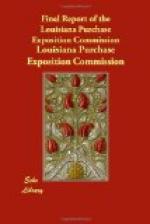The presence of Theodore Roosevelt, President of the United States, and of Grover Cleveland, his only living predecessor in office, intensified the interest of the vast concourse of people at the dedication ceremonies. Their addresses were listened to by 80,000 persons assembled in the Liberal Arts Building.
The committees appointed by the respective Houses of Congress to attend the dedication ceremonies consisted of the following Senators and Representatives:
Committee of the Senate.—Messrs. Burnham, New Hampshire; Depew, New York; Penrose, Pennsylvania; Dolliver, Iowa; Hansbrough, North Dakota; Mitchell, Oregon; Teller, Colorado; Berry, Arkansas; Martin, Virginia; Foster, Louisiana.
Committee of the House of Representatives.—Messrs. Jas. A. Tawney, Jas. S. Sherman, Thad. M. Mahon, Richard Bartholdt, H. C. Van Voorhis, Richard W. Parker, Jesse Overstreet, Jas. R. Mann, Walter I. Smith, Jas. M. Miller, E.J. Burkett, S.M. Robertson, C.L. Bartlett, John F. Shafroth, Jas. Hay.
Special rules and regulations providing for an international jury and governing the system of awards, which had been in course of preparation by the Commission and the Exposition Company for some time, were finally drafted and sent to the Commission for approval on May 2, 1902. As approved by the Commission and subsequently promulgated the rules read as follows:
UNIVERSAL EXPOSITION, ST.
LOUIS, 1904, COMMEMORATING THE
ACQUISITION OF LOUISIANA TERRITORY.
1. The total number of jurors in the international jury of awards shall be approximately 2 per cent of the total number of exhibitors, but not in excess of that number, and each nation having 50 exhibitors or more shall be entitled to representation on the jury. The number of jurors from each art or industry and for each nationality represented shall, as far as practicable, be proportional to the number of exhibitors and the importance of the exhibits.
Of this selected body of international
jurors three graded
juries will be constituted:
One, the general organization of
group juries; two, department
juries; three, a superior jury.
2. Each group jury shall be composed of jurors and alternates.
The number of alternates shall
in no case exceed one-fourth of
the number of jurors, and
they shall have a deliberative voice
and vote only when occupying
the places of absent jurors.
3. The United States jurors and alternates of the group juries shall be nominated by the chiefs of departments to which the respective groups belong. The jurors and alternates of the group juries representing foreign countries and the United States insular possessions shall be nominated by the commissioners of such countries.
The Louisiana Purchase Exposition Company shall certify to the board of lady managers the




